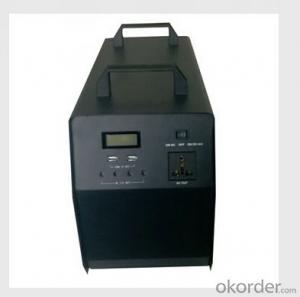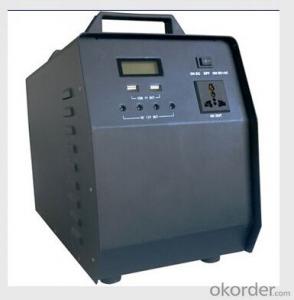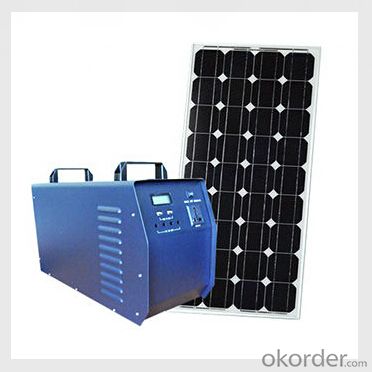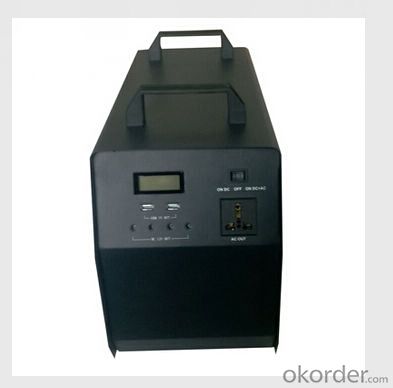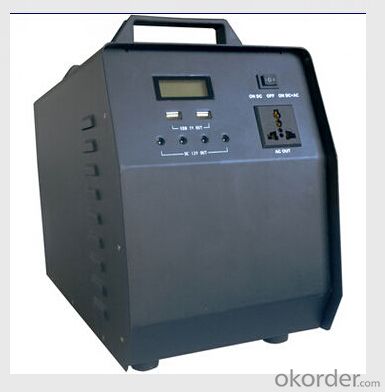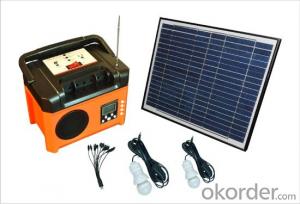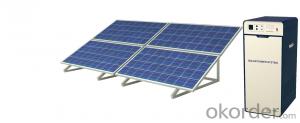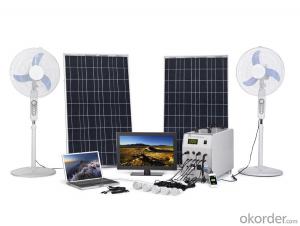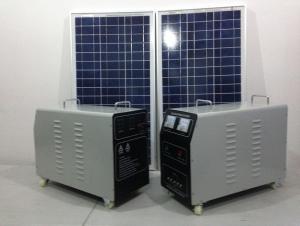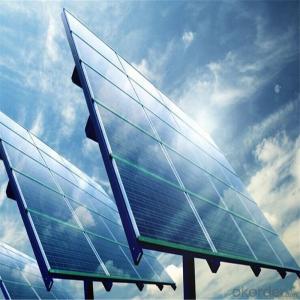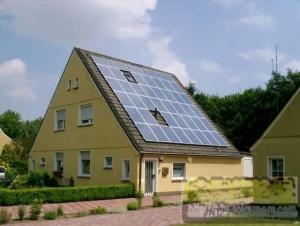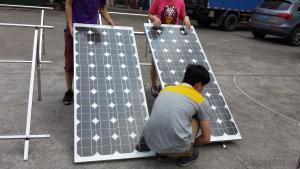Solar Home System Small Solar System 500W
- Loading Port:
- Shanghai
- Payment Terms:
- TT or LC
- Min Order Qty:
- 10000 set
- Supply Capability:
- 5000000 set/month
OKorder Service Pledge
OKorder Financial Service
You Might Also Like
Introduction of Solar Home System
Solar Home System is composed by Solar Panels, Inverters, Charger Controller, Battery, Cable, Mounting Bracket, which is applied to produce electricity for home use.
Solar Home System is quite suitable product in urban area and the place which is short of electricity. As the cost of solar products reduced, more and more family can bear the charge of solar products. These products apply to schools, hospitals, public halls and private housing, communication stations, weather station. Also can use as household appliances, lighting, communications equipment, meteorological equipment.
Our company’s main target is to make every family can use cheap solar energy and enjoy the new innovation of modern science and technology.
Picture of Our Factory

Working Principle of Solar Home System
This is an off-grid solar system which uses batteries to store the solar energy, at the same time, the solar system can be connected with the grid for utilization of grid power. The solar system uses battery power in priority, but when sunshine is not so good or loads consumption is too big which caused the battery power inadequacy, then the system can switch automatically to grid power supply. Meanwhile, the system can charge the batteries with grid power until batteries are fully charged. Then the solar system will switch back to battery power supply.
Product Details of Solar Home System
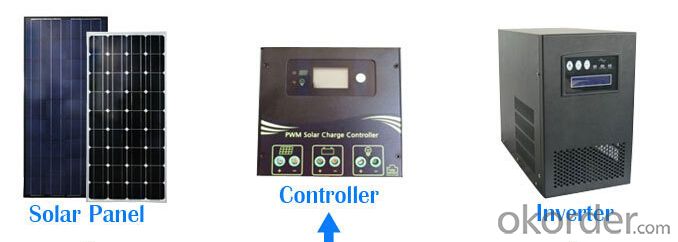
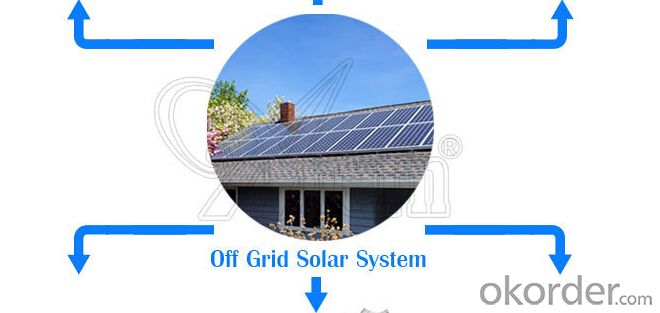

Working Principle of Solar Home System
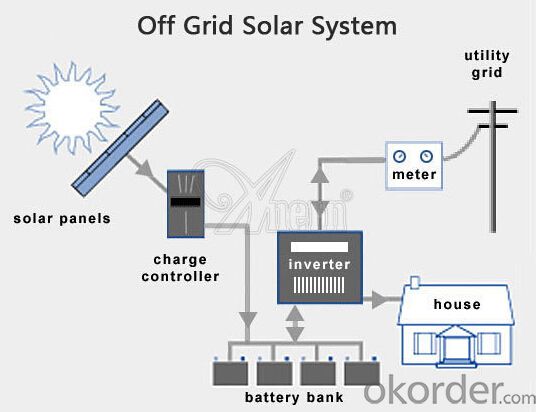
Specification of Solar Home System
Technical data: | |||||||||
Inverter | Rated load power | 500W | |||||||
Output wave | modify sine wave | ||||||||
Input voltage | 12V | ||||||||
Output voltage | DC:12V | ||||||||
Output frequency | 50HZ/60HZ | ||||||||
Precision of output frequency | ±6% | ||||||||
Solar panel | Pmax | 60W | |||||||
Vmp | 17.5V | ||||||||
Imp | 3.429A | ||||||||
Charger | Charger voltage & current | 12V10A | |||||||
Battery | Capacity | 12V38AH | |||||||
Power box | Spray paint iron box, input, output, ammeter, voltmeter, master switch and so on | ||||||||
Package data: | |||||||||
Part | Size (L*W*H mm) | Weight (kg) | 20' (pcs) | 40' (pcs) | |||||
Power box | 520*220*430 | 35 | 140Sets | 320Sets | |||||
Solar panel | 790*700*50 | 7 | |||||||
Solar panel bracket |
|
| |||||||
Loading electrical equipment(For consult) | |||||||||
Name of Load | Power(W) | Quantity | Working Time per Day (H) | Working Days | |||||
Color TV | 65W | 1 | 1 | 2 days | |||||
Satellite TV Receivers | 25W | 1 | 1 | 2 days | |||||
lamp | 11W | 2 | 6 | 2 days | |||||
Other | 150W |
| 1 | 2 days | |||||
Advantage of Our Solar Home System
1 Excellent Performance: Our Solar Home System is composed by Brand Standard Kits with high quality. Our solar system has the advantage of high efficiency and stable operation. We can ensure our product with a long life period.
2. Small Orders Accepted: We can accept small orders as our customer’s trial order.
3. Guarantee/Warranty: We supply 10 Years Product Warranty and 25 Years Performance warranty.
4. Warehouse: We have warehouse overseas which can bring great convenience to our customer to pick up the products.
- Q: Can a solar energy system be installed on a building with a slate roof?
- Installing a solar energy system on a building with a slate roof is indeed possible. However, there are certain factors to consider and precautions to take into account due to the unique nature of the slate roof. Properly distributing and supporting the weight of the solar panels and mounting system is crucial to avoid any potential damage. Moreover, the installation team must exercise extra caution to prevent any cracks or breakages in the slate tiles during the process. To ensure a safe and successful installation, it is highly recommended to collaborate with experienced professionals who specialize in installing solar energy systems on slate roofs.
- Q: How do solar energy systems impact the reliability of the electricity grid?
- Solar energy systems can have both positive and negative impacts on the reliability of the electricity grid. On one hand, solar energy systems can enhance grid reliability by diversifying the energy sources and reducing reliance on traditional fossil fuel-based power plants. This can help prevent power outages and reduce the vulnerability of the grid to disruptions. Additionally, solar energy systems can contribute to the decentralization of power generation, empowering communities and reducing the risk of widespread blackouts. On the other hand, solar energy systems also pose challenges to grid reliability. Their intermittent nature, as solar power generation depends on sunlight availability, can create fluctuations in the supply of electricity. This intermittency requires the grid to be more flexible and adapt quickly to varying solar output. To ensure grid stability, additional measures such as energy storage systems and advanced grid management technologies may be necessary. Overall, the impact of solar energy systems on grid reliability depends on various factors such as the level of solar penetration, grid infrastructure, and the implementation of supportive policies and technologies. With proper planning and integration, solar energy systems can contribute to a more reliable and resilient electricity grid.
- Q: Can solar energy systems be used in areas with high levels of air pollution from industrial activities?
- Yes, solar energy systems can still be used in areas with high levels of air pollution from industrial activities. While air pollution may reduce the efficiency of solar panels to some extent, they can still generate electricity even in polluted environments. Regular cleaning and maintenance of the panels can help mitigate the impact of pollution, ensuring optimal performance over time. Additionally, installing solar energy systems can help reduce reliance on polluting sources of energy, contributing to the overall improvement of air quality in the long run.
- Q: Can solar energy systems be used for powering electric vehicle solar charging canopies?
- Yes, solar energy systems can be used to power electric vehicle solar charging canopies. Solar panels installed on the canopies can generate electricity from the sun, which can then be used to charge electric vehicles. This sustainable approach reduces reliance on traditional power sources and helps promote clean energy solutions.
- Q: Can solar energy systems be used for powering off-grid wildlife monitoring stations?
- Yes, solar energy systems can be used for powering off-grid wildlife monitoring stations. Solar panels can capture sunlight and convert it into electricity, which can then be stored in batteries for use during the night or cloudy days. This makes it a reliable and sustainable source of power for remote wildlife monitoring stations that are located far away from the grid. Additionally, solar energy systems are cost-effective and environmentally friendly, making them an ideal choice for powering off-grid wildlife monitoring stations.
- Q: Can solar energy systems be integrated into building design?
- Yes, solar energy systems can be integrated into building design. In fact, integrating solar energy systems into building design is becoming increasingly common and is considered a sustainable and cost-effective approach to generating electricity. There are various ways to incorporate solar energy systems into building design, including rooftop solar panels, solar facades, and solar windows. Rooftop solar panels are the most commonly used method of integrating solar energy systems into building design. They can be installed on the roofs of buildings, either as standalone structures or integrated into the roof itself. These panels capture sunlight and convert it into electricity, which can be used to power the building or be fed back into the grid. Solar facades are another way to integrate solar energy systems into building design. These systems involve installing solar panels on the outer walls of buildings. They not only generate electricity but also act as a protective layer, reducing heat gain and improving the building's energy efficiency. Solar windows are a relatively new development in building-integrated solar energy systems. These windows are designed with built-in transparent solar cells that can capture sunlight and generate electricity while still allowing natural light to enter the building. Solar windows have the potential to revolutionize building design by seamlessly integrating renewable energy generation into the building envelope. Integrating solar energy systems into building design offers several advantages. First and foremost, it allows buildings to generate their own electricity, reducing reliance on fossil fuel-based power sources and lowering utility bills. Additionally, it contributes to the reduction of greenhouse gas emissions, promoting a cleaner and more sustainable environment. Moreover, solar energy systems can enhance the aesthetic appeal of buildings, turning them into visually striking examples of sustainable architecture. In conclusion, solar energy systems can indeed be integrated into building design. With various options available, including rooftop solar panels, solar facades, and solar windows, buildings can generate their own clean, renewable electricity, reduce their carbon footprint, and contribute to a more sustainable future.
- Q: Can solar energy systems be used in areas with limited space?
- Yes, solar energy systems can be used in areas with limited space. There are various compact and space-efficient solar panels available, such as rooftop solar panels, solar awnings, and solar tiles, which can be installed in small areas. Additionally, advancements in technology have led to the development of flexible and portable solar panels that can be used in areas where traditional panels may not be suitable.
- Q: How often do solar panels need to be cleaned or maintained?
- Solar panels typically require minimal maintenance and cleaning. In most cases, they only need to be cleaned once or twice a year, depending on the location and climate. Regular inspections and light cleaning can help ensure optimal performance and efficiency of solar panels.
- Q: Can solar energy systems be used in powering dental clinics or medical clinics?
- Yes, solar energy systems can definitely be used to power dental clinics or medical clinics. Solar energy is a clean, renewable and sustainable source of power that can be harnessed through photovoltaic (PV) panels to generate electricity. These panels convert sunlight into usable energy, which can then be used to power various electrical equipment and appliances in dental or medical clinics. Dental and medical clinics typically require a significant amount of electricity to run their operations, including lighting, air conditioning, medical equipment, computers, and other electrical devices. By installing solar panels, these clinics can reduce their reliance on the traditional power grid and lower their electricity costs. Solar energy systems can be customized to meet the specific energy needs of dental or medical clinics, ensuring that they can operate smoothly and efficiently. The amount of electricity generated by solar panels can be optimized by determining the clinic's energy consumption patterns and installing an adequate number of solar panels to meet the demand. In addition to cost savings, using solar energy systems also has environmental benefits. Solar power is a clean energy source that produces no greenhouse gas emissions or air pollutants during operation. By switching to solar energy, dental and medical clinics can reduce their carbon footprint and contribute to a healthier environment. Furthermore, solar panels have a long lifespan and require minimal maintenance, making them a reliable and durable energy solution for dental and medical clinics. With proper installation and routine inspections, solar energy systems can provide a consistent and uninterrupted power supply for many years. Overall, solar energy systems are a viable and practical option for powering dental or medical clinics. They offer cost savings, environmental benefits, and a reliable source of electricity, enabling clinics to operate efficiently while reducing their impact on the environment.
- Q: Can a solar energy system be installed in an off-grid location?
- Yes, a solar energy system can be installed in an off-grid location. In fact, off-grid locations are ideal for solar energy systems as they often lack access to traditional sources of electricity. Off-grid solar energy systems consist of solar panels, batteries, charge controllers, and inverters. The solar panels collect sunlight and convert it into electricity, which is then stored in batteries for use during times when the sun is not shining. The charge controller regulates the flow of electricity between the solar panels and the batteries, while the inverter converts the stored DC electricity into AC electricity for use in powering appliances and devices. These components work together to provide a reliable and sustainable source of electricity in off-grid locations, reducing dependence on fossil fuels and minimizing environmental impact.
Send your message to us
Solar Home System Small Solar System 500W
- Loading Port:
- Shanghai
- Payment Terms:
- TT or LC
- Min Order Qty:
- 10000 set
- Supply Capability:
- 5000000 set/month
OKorder Service Pledge
OKorder Financial Service
Similar products
Hot products
Hot Searches
Related keywords

